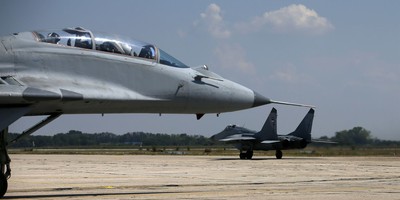They are the forgotten warriors of the Iraq War, the men whose lives and families and careers blew up in "murder" charges on a vicious battlefield, the pieces coming down in Fort Leavenworth's military prison where the men now serve long sentences. Together, they make up the Leavenworth 10, not always at Leavenworth and not always 10, a group of cold-luck cases still working their way up the ladder of appeals and the clemency process, their families hoping to free them before many more years go by.
They all got bad news recently when word came that the Army Court of Appeals denied Army Ranger 1st Lt. Michael Behenna, 28, a new trial despite the introduction of exculpatory evidence originally withheld by the prosecution. Behenna faces 13 more years of a 15-year sentence for the unpremeditated 2008 "murder" of an insurgent who killed two of his men in post-surge Iraq, an al-Qaida terrorist for whom the Army would issue a kill/capture order before realizing he was already dead.
Why no new trial?
At almost the same time, Assistant Secretary of the Navy Juan Garcia overruled recommendations from the Naval Clemency and Parole Board and from brig officials at Miramar Marine Corps Air Station that Marine Sgt. Lawrence Hutchins, 27, be granted early release. Hutchins has served more than five years on a 15-year sentence that was reduced to 11 years. The sentence was once recommended to be cut to five years, and once thrown out (he spent nine months free starting June 2010). He faces the balance of the 11-year-sentence for conspiracy and unpremeditated "murder" of a man he believed was the killer of Marines and civilians in pre-surge Iraq.
Why no parole?
I put quotation marks of incredulousness around "murder" because this was a war zone -- a chaotic, urban war zone in which counterinsurgency theory (COIN), winning hearts and minds, just didn't go according to the book. Those restrictive rules of engagement (ROEs) failed to impress jihadists or their clans with America's good intentions, and the schizoid mishmash of firepower, nation-building, harsh interrogations, bribery, police work and social work made our forces pawns of an untenable policy. These young men shouldn't be the ones to pay for that policy. We should use this week's one-two punch of "military justice" for some national soul-searching. It's the least we can do for men who risked everything for our country.
Recommended
The two cases are quite different, but they share more than miscarriages of justice. Reading back before the judicial nightmares began is to follow two warriors contending with a basic COIN flaw: the notorious practice known as catch-and-release, the opaque, bureaucratic process by which U.S. forces risked their lives to "arrest" insurgents on the back-alley battlefield only to see them released to kill again for "lack of evidence." In both Behenna's and Hutchins' cases (and others), catch-and-release was the ultimate manifestation of chaotic command and no control, and served as a common trigger of events. Behenna himself had to drive home the very insurgent known to be responsible for the IED (crude, handmade bomb) that recently killed two of his men. He decided to perform one more interrogation himself during which the insurgent rushed him, at which point Behenna fired. This is the self-defense scenario supported by the prosecution's own forensics expert. It was suppressed at Behenna's trial and ignored on appeal.
Hutchins' case is more complex, involving an eight-man plot to "snatch" and kill a "prince" of the insurgency, someone responsible for everything from IEDs to recruiting suicide bombers. Again, it was catch-and-release, and not for the first time, that lit the fuse for this Marine squad. They caught the terrorist and then, on release, had to drive him home. They later decided to fake an incident in which the "prince's" killing would be ROE-lawful. While Hutchins waited in ambush, the wrong man was seized, they all shot at him and then covered up the incident. No Marine was confined for more than 525 days except Hutchins (11 years).
Hutchins also drew a rebuke from Navy Secretary Ray Mabus, who, while Hutchins appealed and sought clemency, slandered him as a premeditated and indiscriminate murderer. Hutchins lawyer, Maj. Babu Kaza, points out that Hutchins was found guilty of neither allegation and that Mabus' unprecedented public comments constitute "unlawful command influence" on the workings of justice.
At least that's what the military calls these nightmares. Do you?























Join the conversation as a VIP Member